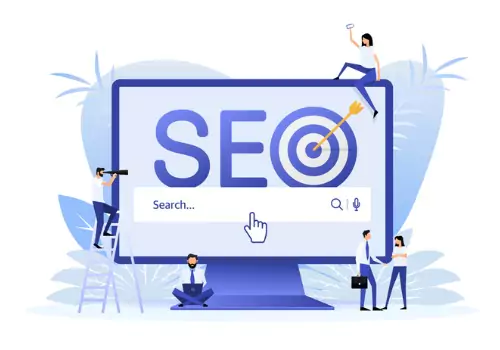
The Myths, Mysticism and Mystery Behind SEO: 5 Common SEO Myths
In Mountain View, CA, deep within the depths of the Googleplex, a gathering of digital witches and sorcerers cackle manically, crafting the spells and incantations that determine where YOUR business lands on their sacred “Search Engine Results Pages.” At the heart of it all lies Google’s mysterious ALGORITHM, the powerful and ever-evolving force behind search engine optimization. For the rest of us business owners and content marketers, navigating this digital labyrinth means continuously creating fresh, engaging content, day in and day out, in an endless effort to appease the insatiable beast that is Alphabet Inc. We live in constant fear, never knowing what the ALGORITHM might decide. Will your business thrive? Or will it falter and languish at the hands of our malevolent Google overlords? The world may never know how the inner workings of Google and Alphabet Inc. truly work.
Sure, that might have been a bit of an exaggeration—okay, more than a bit. However, the mysterious and almost mythical descriptions of Google’s inner workings are how some people, both seriously and humorously, perceive Google and its search rankings. Fortunately, today’s marketers are savvy enough to navigate Google’s admittedly frustrating algorithm and help your business website achieve high rankings in search results. At the same time, we understand what truly works for search engine optimization and can separate fact from fiction when it comes to effective SEO strategies. With that in mind, here are some common SEO myths we’ve encountered at 309 Marketing Group and the truth behind them:
Myth 1: You Only Have to Implement SEO Once for Your Website
We have businesses coming to us all the time, requesting SEO services from our team. These businesses often understand the importance of good SEO and what it can do to boost a website’s rankings in Search Engine Results Pages (SERPs). However, many of these same businesses also expect to buy a package of SEO and never have to do anything with it again. Unfortunately, this isn’t the case.
SEO is an ongoing digital marketing strategy. In truth, Google is constantly tweaking and updating its algorithm to determine the results rankings on SERPs. If that algorithm suddenly changes and no one is actively monitoring your website’s SEO, all your SEO efforts can disappear overnight! To ensure your business continues to rank highly for the keywords you wish to target, it takes consistent monitoring, updates to content, and continual optimization of a website’s functionality and speed.
Myth 2: The More Keywords Per Page, the Better
Before 2010, when businesses were still wrapping their minds around digital marketing, a reliable SEO strategy for getting a website to rank highly on SERPs was to stuff as many keywords as possible onto a page. And for a time, this worked! It was the Wild West for SEO professionals. However, it didn’t take long for Google to get wise to this spammy strategy. In 2011, when Google launched its Panda algorithm update, it began penalizing websites that capitalized on keyword stuffing.
Thankfully, enough time has passed that any SEO expert worth their weight in salt will know keyword stuffing is no longer a viable SEO strategy. However, even over 10 years later, the myth of keyword stuffing persists, and those not as familiar with SEO might try using it for their website. While a webpage can rank highly for more than one keyword, each keyword must make sense with the content written, be seamlessly integrated into the text, and not exceed 3% of the density of your writing.
Myth 3: Meta Tags Won’t Impact Your SEO
What even are meta tags? Do they matter for your business website’s online presence? As long as your content is good, meta titles and descriptions shouldn’t make a difference, right? WRONG! Meta tags DO matter. They matter a whole lot, in fact! Google and other search engines rely on the short text you provide to rank your websites properly.
When searching for anything on the web, the link you see on a SERP will include whatever meta title and meta description was assigned to it. This means your meta tags are often the first thing any potential client or customer will see about your business website. It’s also one of the few ways search engines can begin analyzing a webpage to determine its relevancy to specific keyword targets. Hence, meta tags are an absolute MUST when creating content for SEO.
Myth 4: All You Need to Rank Highly is a Sitemap
Some of the best myths have an element of truth to them. Sitemaps can impact your website’s ranking is a true statement, for example. However, what isn’t true is the overestimation of a sitemap’s power. While you can expect a sitemap to improve your SEO rankings, a sitemap’s creation is only one small factor for an entire SEO strategy.
Think of a sitemap as a buffet table of your website’s unique web pages. Rather than having each “dish” thrown at Google to sort through, your sitemap organizes your content to make it easier for a search engine’s bots to crawl or “sample” each page. In turn, Google understands everything available on your sitemap or “buffet table” and can more effectively recommend a page to users. However, if your web pages still lack helpful, engaging, “tasty” content, Google won’t bother ranking them highly or recommending them to others.

Myth 5: Local SEO Isn’t Worth the Effort
If you don’t have a storefront or you plan to reach customers beyond your business’s location, why bother with local SEO efforts, right? Not so fast! Even if you don’t own a brick-and-mortar business, local SEO is a highly effective strategy for small and large businesses alike. If you aren’t currently including some local SEO work in your digital marketing strategy, you ought to.
Local SEO involves more than content writing focused on specific geos. Local SEO also includes optimization of your Google profile and map listings to ensure your business is always seen online in your area. It doesn’t matter if you don’t have a physical location; you’ll still want to target large audiences with your ads, and doing so through geography is one of the best ways. If you’re still unconvinced, just know that 30% of Google mobile searches use location, and 72% of consumers look for business locations in Google Maps. It pays dividends if your business appears in these local map listings.
Do SEO the Right Way with 309 Marketing
Without in-depth knowledge of SEO history or a lack of understanding of modern SEO tactics, it’s understandable if you once believed a few of these myths to be true. Unfortunately, the mysterious nature of Google’s algorithm doesn’t clear the air of confusion that often causes SEO misunderstandings. Thankfully, companies like 309 Marketing Group know what does and doesn’t work for a reliable, effective SEO strategy. We are also experts in all other areas of digital marketing and can offer website design and traditional media solutions for businesses of all industries. If you wish to learn more about the misconceptions prevalent in the digital marketing world, see some of our other blogs. Or, to request a consultation with our team, call us today at 309-213-9398.
